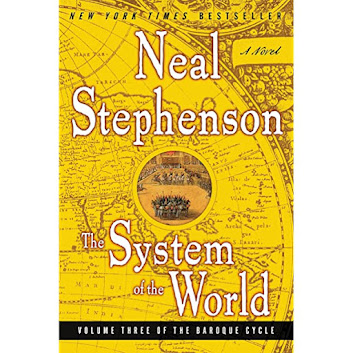Bookshot #173: The System of the World
Okay, I haven't read everything that Neal Stephenson's ever written, but, I'm going to go ahead and
plant this marker now: The Baroque Cycle might end up being the best and most ambitious thing he's ever written. It's been more than a few years since I finished Volume II of this series, The Confusion (and it seems like even longer since I read the first volume, Quicksilver) but now that I finished the final volume, The System of the World, part of me immediately wants to go back and re-read the other two volumes because I have a feeling this is a trilogy of books that you could read multiple times and find different things to enjoy every single time.I suppose we should clear something up before I get too much further: this isn't really a trilogy. It's actually eight books that were combined into three for publishing convenience, which makes a certain amount of sense. So, however, break it down this series/trilogy/whatever you want to call it is a time-consuming endeavor and could almost qualify for an Epic Bookshot post. (I should really bring those back...)
But, when we last left our heroes: Enoch Root has shown up in Boston to deliver a letter to Daniel Waterhouse, who is living there and has founded his Massachusetts Institute of Technologikal Arts and Prince Caroline of Hannover requested he returns to London and try and effect a reconciliation between Isaac Newton and Liebnitz who are still feuding over calculus and other aspects of Natural Philosophy. Daniel agrees to return and the book opens with Daniel finally making it back to England, but coming ashore in Cornwall, where he meets the Earl of Lostwhistel and starts the design process for a steam engine to pump water out of a mine that's been flooded.
He makes his way to London and there, he's almost assassinated with an 'infernal device' (a bomb) and Waterhouse then forms a club of people to find out who did it and finds that it was actually intended for his friend, Isaac Newton.
Isaac, for his part, is still the Master of the Mint and obsessively pursuing Jack the Coiner, our friend, the King of the Vagabonds, Jack Shaftoe, who he believes has tampered with the Pyx- the locked vault which the government unlocks very rarely and in special circumstances to test the quality of the coin of the realm. Isaac believes that Jack has somehow tampered with it and the coin of the entire realm has been corrupted as a result. Daniel agrees to help Isaac track Jack down.
Eliza (still a Duchess) aids Princess Caroline of Hannover as her life is threatened amid the political tension and scheming between Whigs and Tories over the succession to Queen Anne, who is ailing and deteriorating rapidly. She also helps a member of Minerva's crew, Dappa, begin a campaign against slavery. Eliza's vow to never see Jack again still holds true, but eventually, although she never admits it, we find out there are still feelings between them as they both help each other in various ways. The political situation in England comes to a head and Isaac is soon facing a Trial of the Pyx which could potentially bring him down.
Princess Caroline gets her wish: Newton and Liebnitz sit down and have it out but eventually, come to the conclusion that they have to agree to disagree. Newton- still on the hunt for his Solomonic gold to prove his alchemical theories is convinced that Enoch Root brought Daniel back to life after his lithotomy at the end of the first book- and when he dies shortly before the Trial is set to begin- and I do mean 'shortly'- Daniel revives him, hidden in his sedan chair in the courtroom itself using the Philosopher's Stone- eventually, thanks to Jack's confession and the trial proving successful, Newton is cleared and remains Master of the Mint. Jack does several deals to make sure his boys get free and clear to America, which they do, he confesses to his counterfeiting crimes and is hanged, but the crowd intervenes and saves his life. Jack and Eliza reunited in Versailles and live out their lives together and finally, at long last, Daniel gets to go home.
Overall: I said it at the top and I might pick up a few more Stephenson novels just to be sure, but this might be the best thing he's ever written. It's packed. It's packed with politics, science, history, alchemy, pirates, kings, queens, voyages around the world, scientists, and people who are strongly implied to be immortal. Guess what? There really was a counterfeit coiner and conman that Newton was obsessed with and eventually got convicted of high treason- his name was William Chaloner, so there's a historical basis to more of these novels than we think. Stephenson obviously did his homework for all of these and it shows- but I think what is masterful about these books is that Stephenson captures the sort of 'calm before the storm'/'rising tension' of not just characters and plots coming to a climax, but of whole countries on the eve of revolution and change. As a reader, you feel that tension in a very real way and it takes an excellent writer to put you there. My Grade: **** out of ****



Comments
Post a Comment